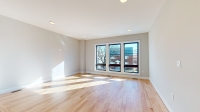Accessory dwelling units: Time to start allowing them in M/SO?
iwasmim said:
I can see why this might seem a slippery slope for municipalities, and I probably wouldn't have liked the idea myself 20 years ago. But now I think it's grand -- I'd love for an offspring to take over the big house, and move into an independent tiny house in the back garden.
Love this idea!
mjh said:
PeggyC said:
Define the "necessity" of increasing population density, please??
I think he's referring to the fact that smart-growth urban density is significantly greener and more sustainable than suburban sprawl.
I like the idea of accessory dwelling units, if well-regulated and carefully done. It's not only green, but offers options for affordable housing, e.g. for older people on fixed incomes or young singles/childless couples just starting out.
Yes, I was referring to the increasing necessity to think in terms of long-term sustainability. Currently, any carbon-footprint savings from high-density urban centers are cancelled out by profligate suburbs. Merely increasing population density of SOM will be fairly meaningless taken by itself unless it's a part of the larger plan to reduce the carbon footprint in all kinds of ways.
I too like the idea of accessory dwelling units, especially if they are located in neighborhoods close to commercial areas and transportation hubs. But the current codes make them virtually impossible in SOM.
I would think that in terms of minimizing the footprint per person apartment buildings would be preferable and more efficient than filling in back yards with tiny homes.
Look at the building on Vose Ave in South Orange. How many ADU's would need to be put into backyards to handle the same number of tenants that one building holds? Also, the Vose Ave building has an underground parking garage so tenants aren't taking up street parking.
Another issue is size. People love watching shows about tiny homes. The reality of downsizing your stuff so you can actually live in one is different than the blissful image often portrayed on TV. I live in a house that is under 800 sq ft. There are five of us. On paper it doesn't sound so bad, but I can't tell you how many times someone has seen what that size actually translates to and then admitting that they would go nuts with so little room. There are some people who will move into a 200 sq ft home and probably love it, but I'm guessing a lot of people will get fed up real quick.
But, as your hypothetical neighbor, my question would be this...what happens when your family moves, or you don't need the tiny house in the garden any more? Is the zoning for your tiny-house limiting it to use by family, or is it OK for the next resident to be a rent-paying unrelated senior, college student, single parent, etc?
I'm in favor of more openness to "MIL suites" and extended family housing, but concerned about creating a back-door to something very different. I believe that towns like ours need to be open to more dense residential use, but am currently in favor of the "transit village" model of building units with their own parking, usually within easy walking distance of a station.
mjh said:
iwasmim said:
I can see why this might seem a slippery slope for municipalities, and I probably wouldn't have liked the idea myself 20 years ago. But now I think it's grand -- I'd love for an offspring to take over the big house, and move into an independent tiny house in the back garden.
Love this idea!
Years ago we went to an open house in Basking Ridge. It had a second building on the property which had a really nice apartment. According to the agent it was specifically zoned only for a family member to live in that apartment. It could not be rented to a non-family member.
That being said, I don't know who would enforce that zoning. If someone was living there and the police came and asked who they were, it would be easy to say "That's my nephew" or whatever. And would the police be able to demand proof of the relationship?
Between my wife and I we have four parents who are all right around 80. We have discussed the fact that at some point at least one of them may end up needing to come and live with us. We could conceivably reconstruct our garage to include a second floor apartment which would combine independent living with immediate proximity. However once we no longer needed that apartment what would we do with it? What would that do to the value and marketability of our home when we decide to move? Especially if it could not be rented (*cough* airbnb *cough*).
(Also, in 10 years we'll have a 17-year-old daughter who would bug us every day to let her move out there.)
I don't like the idea of adding rental properties to existing homes without tight controls. As was pointed out earlier there are plenty of lots in South Orange which could easily accommodate additional structures, some of which could have 2, 3 or 4 apartments. I think that would be excessive.
But check this kit for about $7K: http://www.barnkits.com/product/Arlington.php. Yes it would need some modification to bring things up to code and definitely some interior work to make it pleasant. It seems like there would be enough room inside to build a small bathroom, and maybe a kitchenette. If this was in my back yard with those modifications I could easily see moving a single older parent in. They would have access to the main house as well. This is very low on the "things I'm likely to do list" but it does give you something to think about.
I'd hate to think you'd be charging your 80+ year-old parents rent, though, since the additional income was kinda the point of the OP.
Going a bit off-topic...
Actually, charging an elderly parent a fair and appropriate rent seems to be one of the acceptable ways of passing down assets outside of the gifting limits, and with no medicaid look-back, from what I've read. But I'm not a lawyer or estate expert.
(not an entirely academic discussion, since my 80+ mother lives with one of my siblings, and having space for her will be part of the home purchase decision in a likely relocation)
ctrzaska said:
I'd hate to think you'd be charging your 80+ year-old parents rent, though, since the additional income was kinda the point of the OP.
lizziecat, you may be luckier with your neighbors than we were. Besides, my three-story former house had no downstairs bathroom, an unappealing basement laundry, a garage into which our cars would not fit, no central air, and noisy neighbors on one side and rather inconsiderate ones elsewhere on the street, with periodic on-street parking issues making access to and egress from our driveway difficult at times. There were occasionally issues of irresponsible renters, incidentally, and that went back decades. In any case, I am sure our neighbors mostly were glad to see us go, because we were probably looked upon as unfriendly weird people from another era, an unfortunately negative identity that you are apparently fortunate not to share. In any case, it would not have been worth the money to me to put enough money into the house to make it work for me going forward, and everyone's future and aging process is different. It was a great house to raise a family in, and then it stopped being the right place. I was ready to leave. Still, but I'm disappointed to get quite such a rude and angry-sounding response from a near-contemporary to what it think was a straightforward statement that one solution does not work for everyone because people's needs are different at every age. (And I don't think accessory housing is necessarily a good solution in any case.) I do not know you and you do not know me. We should respect each other's opinions without judgmental insults.
Grand idea. In Santa Barbara, CA has a lot of small houses in the back yard. My MIL lived in one and it was quite fab.
We all scorn the suburbs, but don't want to do anything to slow their development.
grayhill2 said:
That aside, I think it's true that there is an inherent bias in terms of property value when it comes to neighborhoods with rentals or accessory units. On-street parking, not just in snow season, when it is a huge issue, is a major negative; transient population is another. Renting out rooms in a home to get some extra cash means your neighbors then have relatively transient neighbors who may have little stake in maintaining the previous ambience of a street. Making a legitimate accessory apartment within the home helps a little i that respect but not necessarily very much, not to mention your own loss of privacy. And building a free-standing accessory unit or converting a garage is another approach that could be very creative and sounds nice on HGTV, but both lead to similar questions of space, consideration, and so one, And as Peggy noted, dealing with a renter or neighbor at very close quarters isn't necessary an ideal solution to high taxes orto the less tangible matter of simply aging out of a community. Sometimes it is just time to move on.
Since I started this thread, I'll share my perspective. When I moved to this area, I liked the idea of a house, but as a single person I couldn't afford a whole house and didn't need all that space. So I bought a two-family house and rented out the other unit. I have enough space, and the rental income covers my property taxes (barely).
I've had excellent experience with tenants. I always have a choice of solid candidates, usually by word of mouth. My current tenant, for the last five years, is a long-term M/SO resident with grown kids who is deeply involved in the community.
My house is in a highly visible location, and I'm guessing that many people on this thread have seen it and admired how cute it is without realizing that it's a two-family house. I have parking for 6+ cars in the back, so nobody ever parks on the street.
It's unfortunate that most of the multi-family housing in M/SO was apparently built as low-income/affordable housing and is so densely packed together. The parking issues and the Seton Hall party houses have given the whole notion of multi-family housing a bad name around here. If one or two houses per block in areas where there's enough room could incorporate a rental unit, either within the house or in the back yard, it would increase density and assist with the housing affordability crunch.
As the owner of a two family you have the right to evict tenants for no cause. If someone were to rent out a small back yard house do they have the same rights, or do they not have that right because the tenant is no longer living in the same multi family house as the owner.
spontaneous said:
As the owner of a two family you have the right to evict tenants for no cause. If someone were to rent out a small back yard house do they have the same rights, or do they not have that right because the tenant is no longer living in the same multi family house as the owner.
I can ask a tenant to leave at the end of a lease term without cause, but I don't believe I can do that while the lease is in effect. (Or not without legal hassles.) If there's no lease in effect and the tenant is on a month-to-month basis, then I can give them 30 days' notice that I am ending the month-to-month agreement, and if they fail to move out, I can start eviction proceedings.
There are a few carriage houses that are legal rentals. I would guess that they are covered by existing multi-family law. I've spent some time perusing landlord-tenant law and I don't remember seeing anything different for external buildings.
Allowing ADUs would require major changes to building code, zoning laws, etc. There's no way it could happen with the laws currently on the books.
My understanding is that in an owner occupied building the landlord can evict without having to show cause. Yes, you still have to go to court, but you don't have to prove that they are behind rent, that they trashed the place, or anything else like that. In New Jersey the laws are extremely tenant friendly, for buildings that are not owner occupied the only sure way to have a tenant evicted is if they haven't paid rent. So if a back yard tenant starts trashing the place and being a nuisance but pays the rent on time is the landlord stuck since it is not an owner occupied multi family dwelling.
What you're saying seems to be confirmed on page 48 of this document (which won't let me copy the text, or I would just paste it here):
https://www.lsnjlaw.org/Publications/Pages/Manuals/TenantsRights.pdf
It seems to me (not a lawyer) that an exterior building would still count as part of the landlord's home. I believe the purpose of the owner-occupied exemption is to allow the owner to use the property as he/she sees fit -- for example, allowing a family member to occupy the unit.
I remember your family had a nightmarish experience with tenants. Was that an owner-occupied two-family? Fortunately I've had great luck with my tenants and haven't had any first-hand experience with evictions.
kthnry said:
...most of the multi-family housing in M/SO was apparently built as low-income/affordable housing...
What is your basis for this statement?
No, ours was not owner occupied. And when the tenant first decided to turn the back yard into a scrap metal business and then have a total of five adults and four children living in a two bedroom apartment that had one adult and two kids on the lease, we were powerless to do anything. At one point we went to the town for help and were warned that if they stepped in that we as the landlord would be the one cited, not the tenant.
In New Jersey for issues other than non-payment of rent the courts will give tenants repeated chances to comply. Each court date takes months to get.
I also know of a man in South Orange who rented out a two family, again it was not owner occupied. He was a wreck. He said that for 30 years he had great tenants, then he got stuck with the one nightmare tenant. In his case she was purposely sabatoging the radiators, causing water damage, and would then call in repeated no-heat complaints. She would use the no-heat complaints as her justification to not pay rent for the month without being evicted.
A two family or three family dwelling where the owner occupies one of the units is exempt from the very strong anti-evictions laws we have in New Jersey. A small building in the back yard is not physically part of the main building on the property, so people should NOT assume that they will be covered as this could end up being a very costly mistake.
mtierney said:
the elephant in the living in this discussion is the elimination of all the present illegal housing already in both towns. Multiple unrelated folks sharing a home. That is a discussion for serious concern regarding police and fire safety, as when heating, electric and plumbing construction codes are not followed.
Before the town could legitimize new housing units to be built attached to or in the rear of existing properties, some control, possibly grandfathering of some existing add-ones would have to take place.
Grandfathering would go together with the new zoning allowance. But people in tony suburbs don't want poor people living with them. That's what it comes down to.
ctrzaska said:
I'd hate to think you'd be charging your 80+ year-old parents rent, though, since the additional income was kinda the point of the OP.
If the parents voluntarily chipped in, would that be wrong? And isn't the difference merely the wording, not the situation?
Tom_Reingold said:
ctrzaska said:
I'd hate to think you'd be charging your 80+ year-old parents rent, though, since the additional income was kinda the point of the OP.
If the parents voluntarily chipped in, would that be wrong? And isn't the difference merely the wording, not the situation?
I wouldn't charge them. The point would be to allow them to keep the proceeds of the sale of their current house instead of them having to use for rent or to pay for an assisted living facility. But some of those proceeds would be used to construct the cottage/guest house/shack they would be living in.
Rentals
Sponsored Business
Promote your business here - Businesses get highlighted throughout the site and you can add a deal.
























I can see why this might seem a slippery slope for municipalities, and I probably wouldn't have liked the idea myself 20 years ago. But now I think it's grand -- I'd love for an offspring to take over the big house, and move into an independent tiny house in the back garden.